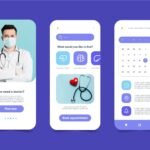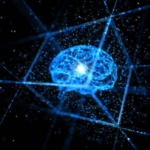Introduction
The future of Artificial Intelligence (AI) is revolutionizing the field of mental health treatment, offering innovative solutions for diagnosis, therapy, and patient care. With the rise of digital health tools, AI-powered mental health applications are making therapy more accessible, cost-effective, and personalized. AI-driven chatbots, predictive analytics, and machine learning algorithms are transforming mental healthcare, addressing issues such as anxiety, depression, PTSD, and more.
The Role of AI in Mental Health
AI is being integrated into mental healthcare to enhance early diagnosis, therapy, and patient engagement. Some of the primary applications of AI in mental health treatment include:
1. AI-Powered Chatbots for Mental Health Support
- AI-driven chatbots like Woebot and Wysa provide 24/7 support for individuals struggling with mental health issues.
- These virtual therapists use natural language processing (NLP) to engage in conversations and provide cognitive behavioral therapy (CBT).
- AI chatbots help reduce the stigma around mental health by offering anonymous support.
2. Machine Learning for Early Diagnosis
- AI algorithms analyze speech patterns, facial expressions, and behavioral data to detect signs of depression, anxiety, and other disorders.
- Machine learning models can assess risk factors and predict potential mental health issues before they become severe.
- AI-based screening tools help doctors make more accurate diagnoses.
3. Personalized Treatment Plans with AI
- AI uses patient data to recommend personalized therapy and medication plans.
- AI-driven apps track mood patterns and suggest coping mechanisms tailored to individual needs.
- Personalized mental health treatment enhances patient outcomes and reduces trial-and-error prescriptions.
4. Virtual Reality (VR) Therapy Powered by AI
- AI-integrated VR therapy is used for PTSD treatment, phobia exposure therapy, and stress management.
- Virtual environments help patients confront and overcome their fears in a controlled setting.
- AI monitors physiological responses to customize therapy sessions.
5. AI-Based Sentiment and Emotion Analysis
- AI tools analyze social media posts, texts, and voice data to detect signs of distress and suicidal thoughts.
- Emotion AI helps therapists understand patient emotions better and adjust treatment strategies.
- Mental health professionals use AI analytics to assess large-scale population mental health trends.
Benefits of AI in Mental Health Treatment
The Future of AI in Mental Health Treatment solutions offer numerous advantages over traditional therapy methods.
1. Increased Accessibility to Mental Healthcare
- AI-powered mental health apps provide 24/7 support without geographical limitations.
- AI bridges the gap in mental healthcare access, especially in underserved areas.
- Patients can receive initial assessments and guidance without waiting for therapist appointments.
2. Cost-Effective Mental Health Support
- AI-based therapy is significantly more affordable than traditional counseling.
- Reduces healthcare costs by minimizing unnecessary visits to mental health professionals.
- AI-powered digital therapy is an alternative for those who cannot afford in-person therapy.
3. Early Detection and Prevention
- AI tools identify early warning signs of mental health disorders.
- Predictive analytics enable proactive intervention, reducing the risk of crisis situations.
- AI enhances public mental health monitoring and suicide prevention efforts.
4. Personalized and Data-Driven Treatment
- AI tailors therapy plans based on patient history, mood tracking, and behavioral patterns.
- Machine learning ensures data-driven, evidence-based mental healthcare solutions.
- AI optimizes medication prescriptions based on genetic and psychological profiles.
5. Reducing Stigma and Encouraging Help-Seeking
- AI chatbots and mental health apps offer a judgment-free space for individuals to express their feelings.
- More people are willing to seek AI-driven mental health support due to the anonymity factor.
- AI platforms raise awareness and educate users about mental health.
Challenges of AI in Mental Health Treatment
Despite its advantages, AI in mental health faces several challenges that must be addressed for widespread adoption.
1. Ethical and Privacy Concerns
- AI mental health tools collect sensitive personal data that must be protected.
- Lack of proper data privacy regulations raises concerns about misuse.
- Patients worry about AI therapy confidentiality compared to human therapists.
2. AI Cannot Replace Human Therapists
- AI lacks the empathy and emotional intelligence that human therapists provide.
- While AI chatbots can offer guidance, they cannot fully replace human interactions.
- Mental health professionals must integrate AI as a complementary tool rather than a replacement.
3. Accuracy and Bias in AI Diagnoses
- AI models depend on training data, which may contain biases affecting diagnosis accuracy.
- Over-reliance on AI without professional oversight may lead to misdiagnosis or incorrect treatment.
- Continuous monitoring and improvements in AI algorithms are necessary to improve accuracy.
4. Regulatory and Compliance Issues
- AI-powered mental health tools must comply with HIPAA, GDPR, and other healthcare regulations.
- Lack of standardization in AI mental health applications creates hurdles in adoption.
- Policymakers need to develop clear guidelines for AI in mental healthcare.
Future Trends in AI-Powered Mental Healthcare
The future of AI in mental health is promising, with innovations shaping the way therapy and treatment are delivered.
1. AI-Powered Wearables for Mental Health Tracking
- Wearables with AI analyze heart rate, stress levels, and sleep patterns to detect mental health fluctuations.
- AI-driven wearables provide real-time alerts for stress and anxiety episodes.
2. Advanced AI Chatbots with Emotional Intelligence
- Future AI chatbots will incorporate advanced emotion recognition and response adaptation.
- AI-driven virtual therapists will interact more naturally and empathetically.
3. AI-Enhanced Cognitive Behavioral Therapy (CBT)
- AI-powered CBT applications will offer interactive therapy sessions with real-time feedback.
- Personalized AI CBT tools will guide users through coping mechanisms tailored to their condition.
4. Integration of AI with Traditional Therapy
- AI tools will assist therapists by analyzing patient progress and recommending tailored strategies.
- Hybrid AI-human therapy models will enhance overall mental health treatment effectiveness.
5. AI for Suicide Prevention and Crisis Intervention
- AI-driven sentiment analysis will improve suicide risk detection on social media platforms.
- AI monitoring systems will provide emergency alerts for high-risk individuals.
Frequently Asked Questions (FAQs)
Q1. Can AI replace human therapists?
No, AI cannot replace human therapists. It serves as a complementary tool to enhance therapy and provide immediate support but lacks human empathy and critical thinking.
Q2. Are AI mental health apps safe to use?
Most AI mental health apps follow strict data protection regulations; however, users should choose apps with strong security measures to protect their personal information.
Q3. How accurate are AI-powered mental health diagnostics?
AI diagnostics are improving but are not always 100% accurate. They should be used as preliminary assessment tools rather than sole diagnostic solutions.
Q4. What is the best AI chatbot for mental health?
Popular AI chatbots for mental health include Woebot, Wysa, and Replika, offering AI-driven therapy and emotional support.
Q5. How will AI impact the future of mental health treatment?
AI will make mental health support more accessible, affordable, and personalized, improving early detection, crisis intervention, and therapy outcomes.
Conclusion
AI is transforming mental health treatment by providing innovative, data-driven solutions for therapy, early detection, and personalized care. While AI cannot replace human therapists, it plays a crucial role in bridging the gap in mental healthcare access. The future of AI in mental health looks promising, with advancements in emotion AI, wearables, and predictive analytics revolutionizing mental healthcare.





